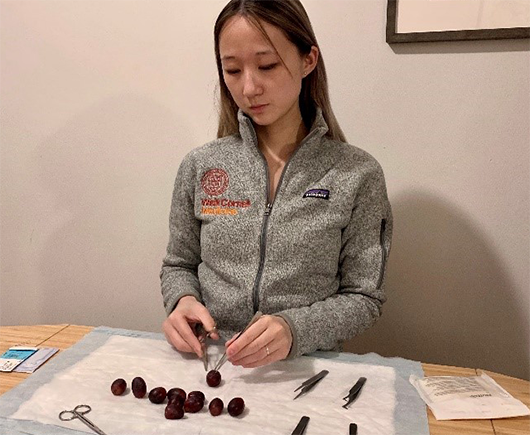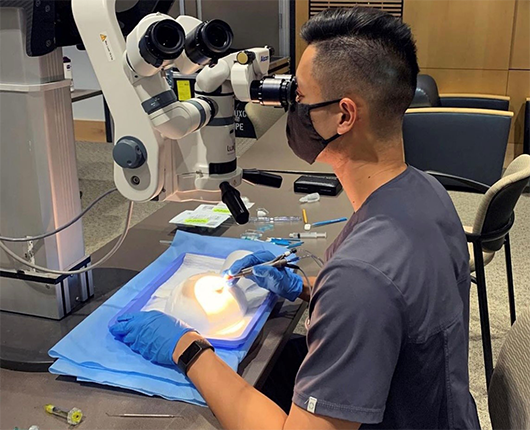Becoming an excellent ocular surgeon is a critical part of residency training. For many of us, love of being in the operating room is the reason we chose this specialty.
But eye surgery is also a high-risk endeavor in which even a miniscule slip of the hand can lead to disastrous outcomes. As a trainee, this can make the operating room a stressful place.
At the same time, your chances to operate during residency are finite — one of the unfortunate lessons of 2020 was that time in the OR is never guaranteed. So, when you do get the opportunity to perform surgery, it’s vital you demonstrate to your attendings that you take each opportunity seriously. And it’s critical you make the most of every single day spent in surgery.
These five tips will help you maximize each OR experience.
1. Practice, Practice, Practice
We have all heard the saying that practice makes perfect, but in residency you’ll probably hear this saying with a slight modification … perfect practice makes perfect. In the beginning, ask one of your attendings, a fellow or even one of your seniors to sit with you and observe your sessions to teach you proper technique. Then check in periodically to make sure you aren’t picking up bad habits.
Many residencies also have a surgical simulator. Spend as much time on it as you can. Several studies have demonstrated that skills developed on the simulator translate to lower rate of complications and better efficiency in the OR.
Be sure to spend time in the wet lab to practice suturing. You can also practice at home with your loupes on grapes or tomatoes. Ask the scrub tech to hold on to any unused suture for you to practice with at a later point.
 |
|
Melisaa Yuan shows how she practices her suturing skills with grapes.
|
2. Come Prepared
Come to the OR with the mindset that you are the primary surgeon for every case that day.
Review the lens calculation sheets and choose a lens for every patient. In the beginning, ask your attendings to review their lens choices with you and have them walk you through their lens selection process.
Know each patient, think ahead and anticipate what complications you might encounter. Do they have pseudoexfoliation? If so, what is your plan for when you encounter loose zonules? Does the patient have a history of tamsulosin use? How will you manage their floppy iris?
Even if you are only assisting, this will make you a more active participant in each surgery.
 |
|
Anthony Mai, MD, practices cataract surgery in the wet labs.
|
3. Ask Questions
Ask your attending questions. Even with a surgery as seemly standardized and stepwise as cataract surgery, you will find there are multitudinous, sometimes subtle and sometimes not-so-subtle variations in how the surgery is performed.
Also ask your attending to walk you through their thought process during each step of surgery. What are you focusing on during this stage? Why do you prefer this second instrument? What is your rationale for where you place your incisions? Why do you like this particular viscoelastic? This I/A tip? The insights you gain from these questions will often be invaluable as you develop your own techniques and preferences as a surgeon.
4. Listen and Respond
Nothing will make attendings more reluctant to hand over cases than a resident who they feel doesn’t listen in the OR. When your attending asks you to stop, you must stop. Eye surgery is complex. Often there are multiple things happening at once, and especially as a beginning surgeon, you might be focused on one thing while four other things are happening that you don’t recognize.
Of course, sometimes it can be hard to hear the feedback your attending is providing during surgery. If you are ever unclear about what your attending is saying, or uncertain about what they want you to do, it’s never wrong to pause and ask for clarification.
5. Critique Your Work
Anytime you perform a procedure, debrief with your attending afterward. Ask for feedback. How did the surgery go? What did you do well? What do you need to work on? Take time to perform the same critique on yourself. What things do you want to focus on for your next case? What can you feel proud of?
Also make sure you record every surgery on video. Recording your surgeries is critical in capturing everything that is happening in the eye, especially in the case of complications. Most complications occur in the span of a millisecond, and the rest of the case is spent in crisis management mode. These highly stressful scenarios can make it difficult to remember details later on when you are trying to determine what went wrong.
Recording each case also allows you to review complications in detail and in an environment that will help you learn from what happened. Even in the absence of complications, watching your surgery videos is a helpful way to improve your technique and identify areas for improvement.
Becoming a safe, efficient and elegant surgeon is the goal of every ophthalmology resident. Utilizing these five tips will help you achieve that goal by maximizing your learning each time you step foot in the OR.
* * *
 Rachel Simpson, MD,
Rachel Simpson, MD, is a glaucoma specialist at Moran Eye Center, University of Utah, in Salt Lake City. She joined the
YO Info editorial board in 2020.